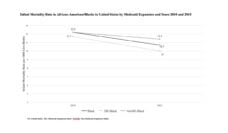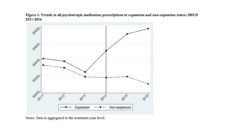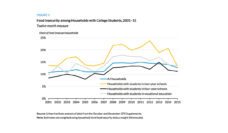One of the primary goals of the Affordable Care Act (ACA) was to increase Americans’ access to health insurance. Expanding Medicaid eligibility was a major component of the ACA because it would insure low-income adults who had not previously qualified for coverage. As of August 1, 2019, 36 states and the District of Columbia expanded their Medicaid programs. Studies examining the expansion suggest that it has improved financial well-being, increased access to mental health care, and reduced infant mortality.
A recent study looked at whether Medicaid expansion ameliorates “very low food security,” defined as the actual reduction in eating because of inadequate household funds. Using data from the Current Population Survey- Food Security Supplement, levels of food security among low-income, childless adults from 2010 to 2013 and 2015 to 2016 (before and after the ACA went into effect in 2014) were compared.
The graph above shows the trends in average rates of very low food security in states that did and did not expand Medicaid before January 1, 2015. States that expanded Medicaid experienced a drop in the percentage of people experiencing very low food security. Non-expansion states on the other hand witnessed a slight uptick in the proportion of people facing very low food security.
Many people in the US make trade-offs between paying for health care and purchasing basic necessities such as food. Medicaid provides free or low-cost insurance, thus decreasing the amount of family income spent on medical care and medication. No surprise, reducing the financial burden of health care costs allows people to afford the food they need.
Databyte via Gracie Himmelstein, 2019: Effect of the Affordable Care Act’s Medicaid Expansions on Food Security, 2010–2016. American Journal of Public Health 109, 1243_1248, https://doi.org/10.2105/AJPH.2019.305168














